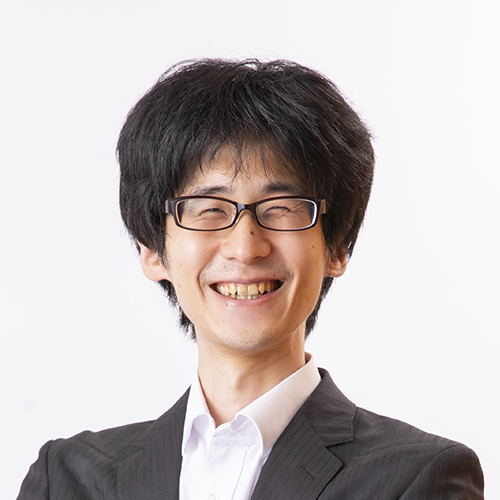
Research Fellow
Ph.D. (Engineering)
■Research Area
Data Science, Artificial Intelligence, Kansei Information Processing, Natural Language Processing, Semantic and Contextual Processing, Automatic Composition of Music
My research focuses on the mechanisms that encourage the re-creation of knowledge by validating discovered and accumulated knowledge. In this day and age of dizzying changes in environment and values, updating wrong knowledge is as important as getting new knowledge. Therefore, I think that a methodology for updating knowledge is needed.
As one example of it, I’m researching automatic composition. If the system makes a “correct” piece of music based on an expert’s theory, and the user doesn’t like it, then the expert’s theory is incomplete at least in that user’s sense of value. In that case, that theory needs to be modified to fit the user’s values. And it encourages the re-creation of existing theories.
I’ve worked on a variety of data science challenges in business. In that process, we often reset a goal because we realized the goal was not what we should be aiming for. Machine learning, the core technology of AI, is a mechanism to create a model which is optimized toward evaluation indicators from given data. Once the creation of models is automated, the human job will be to decide input data and metrics into the AI. I would like to present a methodology about it while conducting specific research.
Assistant Professor, Department of Data Science, Faculty of Data Science, Musashino University, Tokyo, Japan; Research Associate, GLOCOM, International University of Japan since 2018; current position since 2020. Part-time lecturer at the University of Tsukuba. He withdrew with Completion of Course Requirements from the Doctoral Program in Computer Science, Graduate School of Systems and Information Engineering, University of Tsukuba, in 2014, and obtained his Doctoral degree in Engineering from the same university in 2019. He participated in the 2018 CEO Program of the Circular Economy Promotion Organization, a data scientist human resource development program, and was certified as a CEO Leaders.
2007 Graduated with a degree in Informatics, University of Tsukuba
2009 Completed Master’s program in Computer Science, Graduate School of Systems and Information Engineering, University of Tsukuba
2014 Withdrawal with Completion of Course Requirements from the Doctoral Program in Computer Science, Graduate School of Systems and Information Engineering, University of Tsukuba
2019 Doctor (Engineering) University of Tsukuba (Doctor of Thesis)
2014 – 2018 Research Assistant, GLOCOM, International University of Japan
2018 – 2020 Research Associate, GLOCOM, International University of Japan
2015 – Part-time Lecturer, University of Tsukuba
2020 – Assistant Professor, Department of Data Science, Musashino University / Researcher, Asia AI Research Institute, Musashino University
2020 – Research Associate, GLOCOM, International University of Japan
In addition to this, he has been a part-time lecturer at Mejiro University.